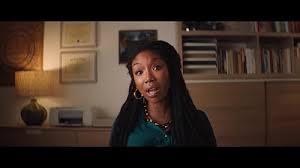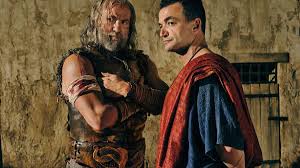The Front Room 2024 Movie Review
New parenthood is difficult enough in the absence of compounding issues. Add to it job difficulties, money problems, and familial baggage, and suddenly one of life’s most beautiful potential experiences becomes overwhelmingly tough. In The Front Room, written and directed by Max Eggers and Sam Eggers from a short story by author Susan Hill, an expectant family does deal with these stressors, sure, but they have another major challenge to overcome. Enter a racist, extraordinarily religious mother-in-law who claims to be possessed by the Holy Spirit, and who can’t be trusted around the family’s youngest. The film is a psychological horror entry in its own right, showcasing a constant parade of challenges that bring the family to the brink of their sanity, but it’s also a dark comedy that highlights familial ills so absurd it would threaten even the most ironclad relationships. The Front Room boasts strong character work alongside some intriguing tonal surprises, but the final act is in need of a little retooling.
Belinda (Brandy Norwood) and Norman Irwin (Andrew Burnap) are hesitantly excited and expecting their second child, an emotional risk for the pair following the loss of their first. Their excitement is challenged when Norman’s father passes. His father’s last wish: for Norman to take in his estranged elderly mother Solange (Kathryn Hunter), an overly devout woman whose beliefs border on cultish (she claims to be regularly possessed by the Holy Spirit), and whose parenting style could be charitably described as suffocatingly oppressive and manipulative. Solange brings with her a massive inheritance that can assuage the young family’s financial woes, so they agree to set her up in the home’s front room. Thus begins the battle of wills between the besieged young mother and her tyrannical elderly mother-in-law, one with serious implications for their newborn child, the family, and their sanity.
Film history is ripe with malicious matriarchs, in dramas like Mommie Dearest and horror entries like Ari Aster’s Hereditary, where a grandmother had secretly been a key member of a demon-worshipping cult. The ‘oppressive in-laws’ trope is a staple of so many excellent films, used for comedy in entries like Crazy Rich Asians or Meet the Parents or horror-comedy in the excellent Ready or Not, when Grace (Samara Weaving) is asked by first responders what happened to her blood and viscera-covered-self, to which she simply replies “in-laws.” The Front Room sits comfortably in this vein, for a memorably comedic take on the material.
In the hands of Kathryn Hunter, Solange is an oppressive and totalitarian force who capably manipulates Norman and opposes Belinda. Kathryn adeptly slides between oppressive, manipulative, and vulnerable with ease, and effortlessly pivots between serious intensity and comedy. Despite her diminutive stature, she looms large over the narrative (even sonically, when offscreen). Brandy Norwood also excels, portraying the increasingly exhausted and defensive young mother well, including in the film’s more intense moments. The pair have a strong antagonistic chemistry, playing off each other well as the narrative escalates. When tension ratchets up following the child’s birth, Brandy’s own performance gains greater intensity in turn, building towards a strong ending that she lands with aplomb.
The film has a unique command of tone, with psychological horror elements and a touch of surreal interludes. There’s an element of mystery that’s handled capably as the film progresses. As Belinda feels increasingly sleep-deprived and backed into a corner, she begins to experience visions of the disturbing matriarch that blur the line between the surreal and reality. Additionally, there’s enough overt manipulation here to cast doubt on Solange’s ‘Signs and Wonders,’ her term for the so-called possession by the Holy Spirit that she appears to suffer. While the film leaves certain things up to interpretation, it does alter the cinematography and lighting enough to suggest Belinda’s disintegrating state, and the balance of power between Belinda and Solange, well. Belinda’s growing strain is persistent and capably translated to the screen.
It’s worth noting here that the film isn’t merely a straightforward psychological horror outing, but rather has regular moments of dark and gross-out comedy, and a bit of slapstick timing throughout. Some of Solange’s terrors are overtly tied to problems associated with her age, used explicitly and emphasized regularly. Quite a few of them work very well, thanks to Brandy Norwood’s line delivery and Kathryn Hunter’s talented ability to pivot the tone of her performance on a moment’s notice. Still, while some of the specific terrors and stressors do escalate and gratefully aren’t static, their repetition loses luster after being over-used without sufficient alteration (like certain dominant sounds, or the gradual increase of Christian iconography). The repetition does serve to illustrate the external encroachments on Belinda’s psyche, but the monotony pervades the narrative a little too successfully for its own good.
Perhaps the most surprising element is the film’s regular use of bodily fluids for tension and comedy, a trait that certainly makes sense in the film’s world but which wears out its welcome as the film escalates. Solange is an oppressive force who weaponizes vulnerability, sure, and we do come to doubt how much of Solange’s seeming weaknesses are manufactured in order to retain her control over the family. That’s incredibly useful, and a well-executed plot device, but just when the cultish Christianity is at its most oppressive (and it would be useful to expand upon it) the narrative’s growing emphasis on the grosser vestiges of age takes over. It’s used for good effect at times, but the emphasis on repetitive and deeply gross elements for humor and tension is regrettable in light of the elements that could have greater screen time.
There’s a lot to like about The Front Room. First and foremost, Kathryn Hunter excels as the malevolent, scheming Solange, while Brandy Norwood lands Belinda’s intensity throughout, especially as she comes to be truly challenged. There’s an interesting back-and-forth between them, and a series of power plays that mostly keep the narrative feeling fresh as it proceeds. The film’s biggest issues pertain mostly to repetition. First, some of Solange’s antagonistic tactics are repeated too readily. Second, they pull away some from the most interesting final act plot elements in the process, and towards scenes and choices that don’t work as well as intended, at least until it lands the ending (which it does). Altogether, it’s a solid dark comedy in the trappings of a psychological horror film.




